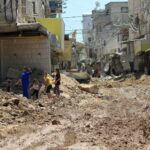
Reuven Rivlin and Emmanuel Macron. French President Emmanuel Macron and President of Israel Reuven Rivlin deliver a speech to the press at the Elysee Palace. Paris, FRANCE -18/03/2021//01JACQUESWITT_choix023/2103181704/Credit:Jacques Witt/SIPA/2103181708 (Newscom TagID: sfphotosfour900835.jpg) [Photo via Newscom]





